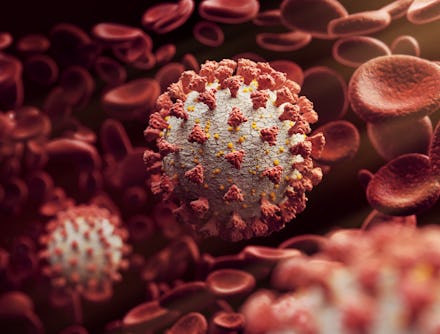You might have some immunity to coronavirus, even if you've never had it

There are now hundreds of COVID-19 vaccine studies in the works. But the role that antibodies play in creating immunity to COVID-19, whether they are developed as a result of fighting the virus directly or injected via a vaccine, is still unknown. What we do know is that the human immune system is multifaceted and complex; antibodies are just part of how our bodies fight against disease. One small but hopeful study, though, suggests that some people may have a level of immunity to COVID-19 without ever having contracted it.
This raises a lot of questions, but the first thing to note is that this study is tiny, so like most coronavirus developments, we need to be cautiously optimistic about it. Secondly, while in everyday life the word “immunity” implies that you are exempt from something — that you won’t get it— that’s not what it means in medicine. Immunity, in this context, could mean having a less severe reaction to the virus, but that doesn’t mean not getting sick at all. Per this (accelerated peer reviewed, mind you) study’s findings, people may be able to effectively fight the virus using T cells, a facet of the human immune system.
T cells are lymphocytes (white blood cells) produced in the thymus gland – thymus is what puts the T in T cells – and they play a lot of roles in immune response. T cells protect the body from pathogens by fighting off invading cells and they also signal other immune cells to gear up to fight. Plus, they remember infections they have fought in the past. Using this battle metaphor, the T cell’s skill set makes them like experienced commanders in fighting off invasion on a cellular level. Thus, T cells can help the immune system fight infections that are similar to infections they have fought in the past by using their cellular memory, reported CNN. Scientists call this T cell response, “T cell reactivity.” To reiterate, this does not mean that a person with reactive T cells is exempt from contracting the virus, but it does mean that they may have a better defense system against it if they do get infected.
The study, which was published Wednesday in the journal Nature, analyzed the blood of 68 healthy Germans who had not been exposed to COVID-19 and 18 confirmed COVID-19 patients. Researchers found that 81% of patients being treated for COVID-19 were found to have T cells that were reactive to the virus. This was expected, since those patients were currently being treated for novel coronavirus, so their T cells were actively engaged in fighting the virus. But the researchers found that 35% of the healthy people who had not been exposed to COVID-19 also had reactive T cells.
Practically speaking, what that means is that even if someone doesn’t have COVID-19 antibodies as a result of exposure to the virus, if they have reactive T cells, their immune system may step in and become responsive in fighting COVID-19, CNN reported.
You may be wondering how people who haven’t been exposed to COVID-19 could develop this response. Well, researchers theorize that even though an individual may not have been exposed to COVID-19, a very specific strain of coronavirus, they could have been exposed to another coronavirus in the past -like the common cold, which is often caused by a coronavirus – and their T cells remember fighting off that infection, reported CNN. “Almost every person in the world has had some encounter with a coronavirus,” Amesh Adalja, senior scholar at the Johns Hopkins University Center for Health Security, told CNN. And if a person’s T cells have battled coronaviruses in the past, it may make them better equipped to fight off COVID-19.
Scientists aren’t sure precisely what role these reactive T cells, or T cells in general, have in combating the disease. “The big question is trying to jump from the fact that they have these T cells to understanding what the role of those T cells might be," Adalja told CNN. Does it make it more or less likely that the person who is infected with Covid actually will develop an illness? And does it have any implications for vaccine development?" Adalja asked. The answer is, as usual, we can’t be sure, but regardless, this feels like hopeful evidence that humanity –and the human body– has more than one way to fight COVID-19.